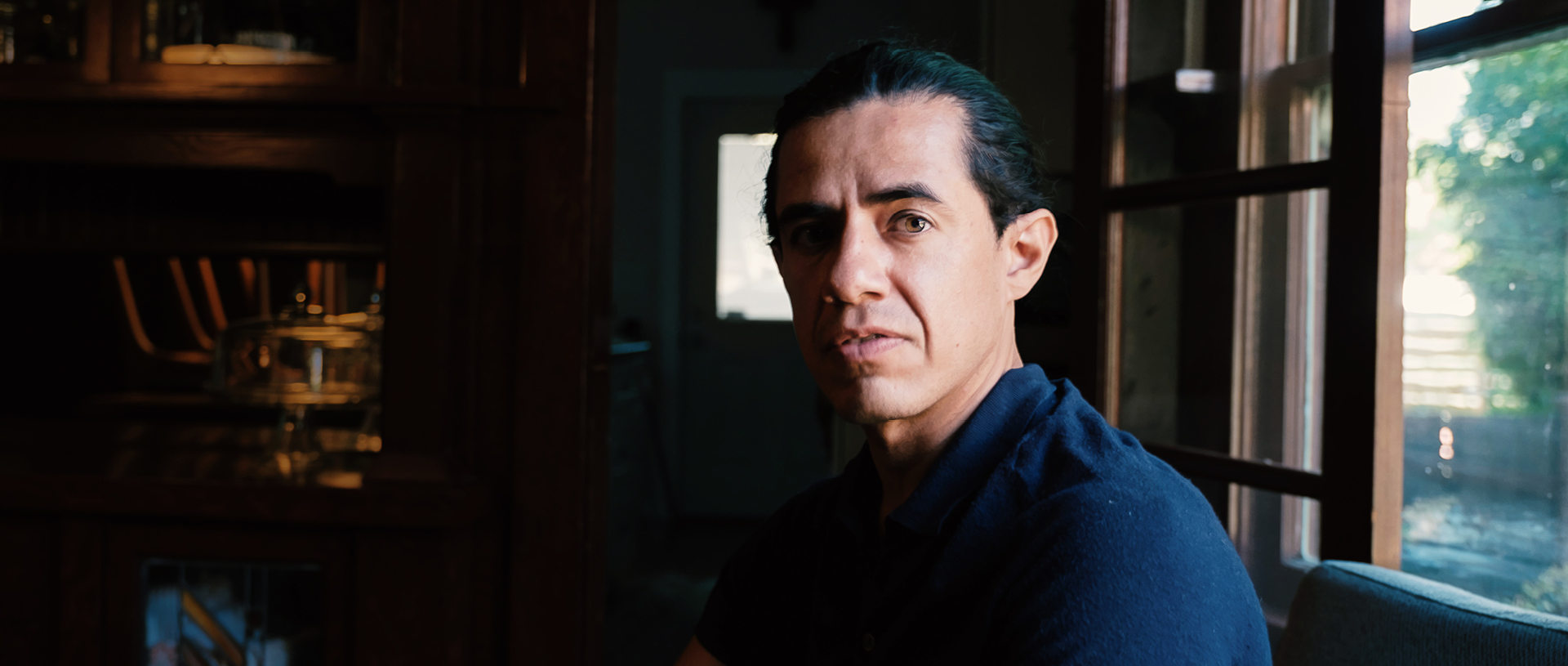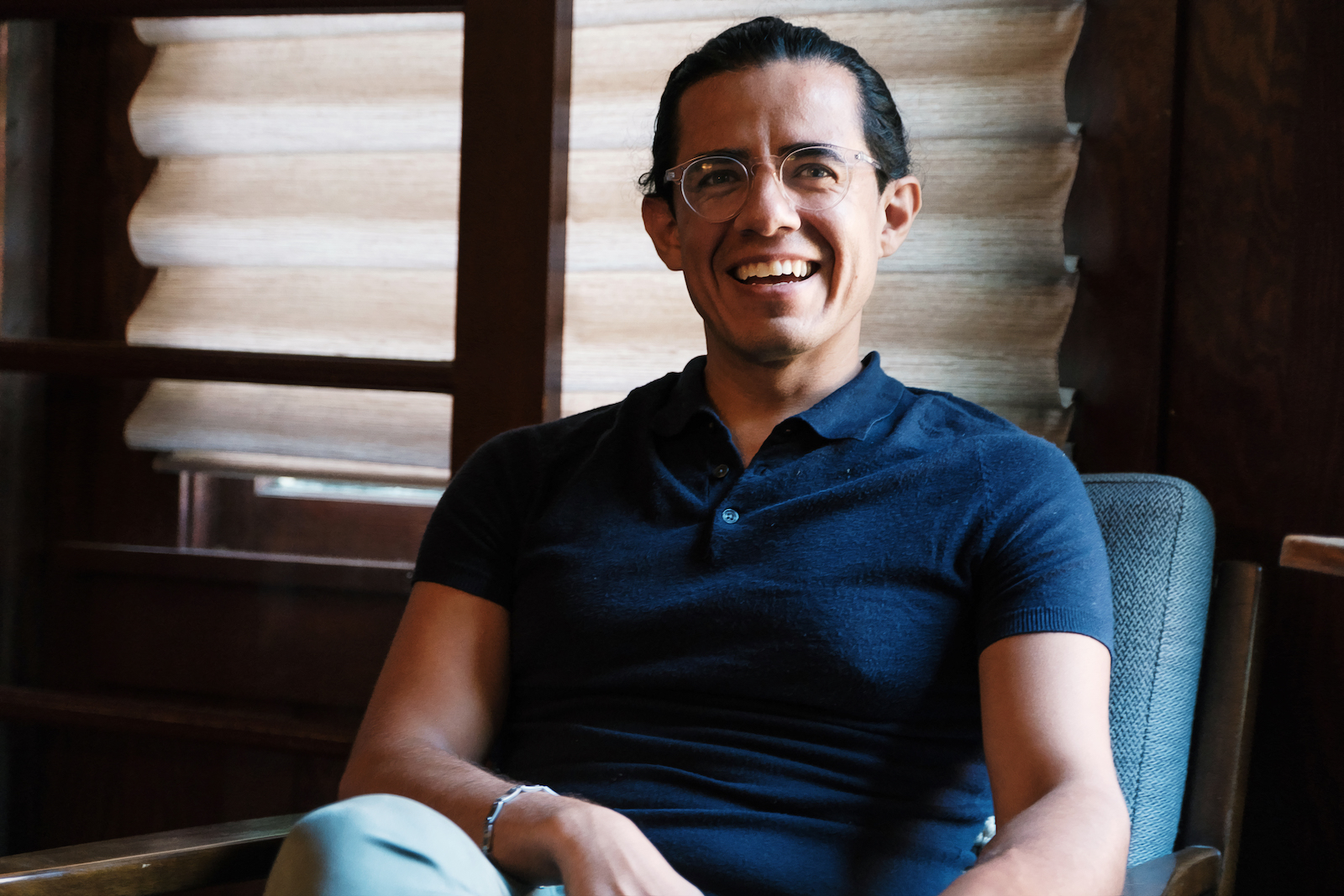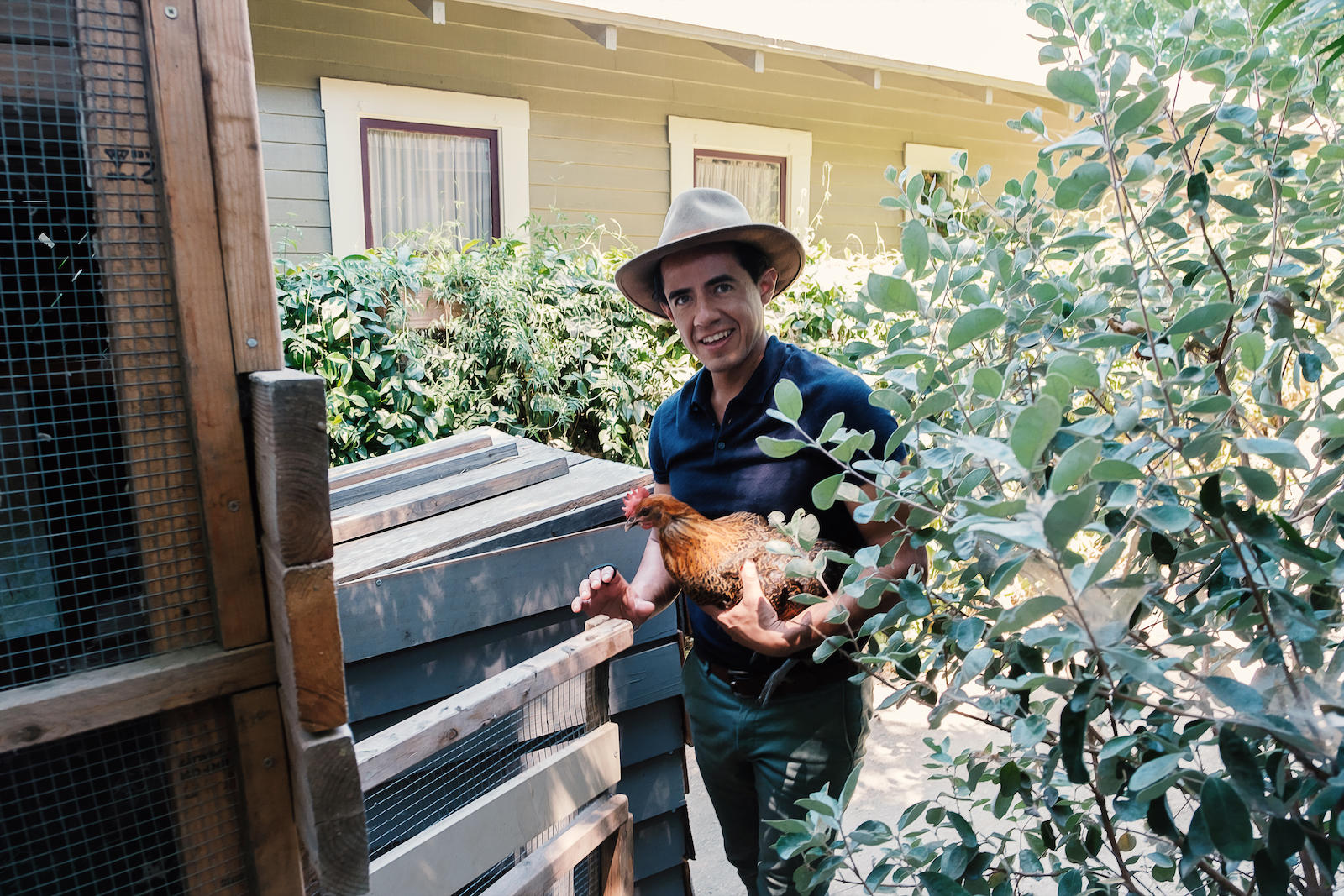
Benzion Perez (MSMFT ’07) says “God is abundant,” and so is the life God wants for us. It doesn’t take long in our conversation for me to see Benzion doesn’t say these words lightly; he isn’t referring to a flimsy idea of prosperity. When we speak over Zoom, he sits out in his lush backyard, under a sunny California sky. But he tells me about how he’s just finished up a counseling session with a client. He shares about the work he’s had to do over the last year, as a therapist providing care through the pandemic, and it’s clear he’s seen his fair share of hardship.
On top of his private practice, Benzion works as a therapist at Kaiser Permanente in Los Angeles. While he, like so many others, has felt the pains of the pandemic—including the loss of some members of his extended family—his job has given him a particularly unique experience. Beyond the various issues he usually deals with in the therapy room, he’s also encountered in his clients the pervading force of grief, loneliness, and even survivor’s guilt.
In January, during California’s winter surge of COVID cases, an opportunity arose at Kaiser for therapists to provide care for frontline workers specifically. Benzion volunteered. For three months, after his regular hours at the hospital, he’d make his way across the Kaiser campus to catch doctors, nurses, and other support staff coming off their shifts. “I would spend time there, talk with them, meet with them, sometimes pray with them, sometimes cry with them, and just do the work of processing,” he says.

Jerome Blanco (MDiv ’16) is editor in chief of FULLER magazine and Fuller’s senior content editor.
Alex Cook is a freelance film director and photographer. See more of his work at alexcookfilm.com.
Benzion Perez (MSMFT ’07) says “God is abundant,” and so is the life God wants for us. It doesn’t take long in our conversation for me to see Benzion doesn’t say these words lightly; he isn’t referring to a flimsy idea of prosperity. When we speak over Zoom, he sits out in his lush backyard, under a sunny California sky. But he tells me about how he’s just finished up a counseling session with a client. He shares about the work he’s had to do over the last year, as a therapist providing care through the pandemic, and it’s clear he’s seen his fair share of hardship.
On top of his private practice, Benzion works as a therapist at Kaiser Permanente in Los Angeles. While he, like so many others, has felt the pains of the pandemic—including the loss of some members of his extended family—his job has given him a particularly unique experience. Beyond the various issues he usually deals with in the therapy room, he’s also encountered in his clients the pervading force of grief, loneliness, and even survivor’s guilt.
In January, during California’s winter surge of COVID cases, an opportunity arose at Kaiser for therapists to provide care for frontline workers specifically. Benzion volunteered. For three months, after his regular hours at the hospital, he’d make his way across the Kaiser campus to catch doctors, nurses, and other support staff coming off their shifts. “I would spend time there, talk with them, meet with them, sometimes pray with them, sometimes cry with them, and just do the work of processing,” he says.
Jerome Blanco (MDiv ’16) is editor in chief of FULLER magazine and Fuller’s senior content editor.
Alex Cook is a freelance film director and photographer. See more of his work at alexcookfilm.com.


Describing the atmosphere among frontliners, Benzion says they were “completely overwhelmed and bombarded.” I watch him search for the right words, as he says, “It was beyond comprehension. Like something out of those medical TV shows, like Grey’s Anatomy, where everything is chaos. But it was very real.” A sense of fear hung over many of his conversations, as medical workers grappled with the reality that each of them was “only as safe as their most exposed nurse”—referring to the very contagious nature of the virus and an exposure’s potential to have a ripple effect across the team. “Getting a chance to see those medical professionals provide care to our community and our loved ones—where their own safety is not guaranteed—you just learn to have gratitude, and say, wow, I cannot believe people do this.”
He was glad to be able to offer some form of help to these healthcare workers by contributing the kind of care he specializes in. Of both his volunteer work with frontliners and of his many other clients, he says, “I can’t counsel someone out of COVID, and I can’t stop someone from having COVID, but I can provide care, comfort, and love to the people being impacted by it.”
As he details more of the struggles his clients have had to carry in the past year and a half, I ask him what it’s like to walk alongside people who are enduring so much, while he himself experiences the ongoing trauma of the pandemic and must be in need of his own care too.
“When I was studying to be a therapist,” he shares, “I went through the very sudden and tragic death of my mother.” He told his professors then that he didn’t know if he’d be able to continue with his program at Fuller, because he didn’t know where he would draw the emotional and mental energy required for it while dealing with his deep grief. What happened, he explains, was that those professors, along with friends and his cohort, came around him in support. “There was so much grace and so much kindness poured out on me during that season,” he says. “God was tremendously faithful, and God was so abundant.” That experience in particular made a tremendous impact on how he understood God, and on how he saw God’s call for him as a therapist.
“During that season, God put a calling on my life that said I was responsible now for people who were hurting, that I was responsible for people working through their trauma and grief.” Benzion points to the Beatitudes, which promise those who mourn will be comforted. He says God uses others to “stand with people in their darkest hours.” Having been a recipient of this sort of comfort, he’s encouraged to stand with others in the same way.
All the while, he knows he must continue to receive care for himself, even as he provides it for others. During the pandemic, his wife and four children have been a central source of community and support—each one of them being there for one another. He recalls a month-long RV trip they took in the summer of 2020, saying, “The six of us being together as a community and doing life together was so dear.” He also speaks warmly of the connections among friends and neighbors that developed over the last year. Benzion describes neighborhood bike rides where they’ve had up to 20 people—adults and kids—connecting over the simple but fun activity of riding around town. And he talks about the little acts of generosity made by friends and neighbors over these months. “Just this last Sunday, within the span of half an hour, we had friends across the street drop us off a box of seltzer, and we had someone else drop off cupcakes.” Later, other friends invited his family for an outdoor dinner of chili, with social distancing and masks. Benzion says, “There was this mindset in our family throughout this pandemic that we would have community.” Community, as he understands it, is central to the abundant life we ought to have.


He acknowledges that for many, these forms of community may not be as easy to come by. In sessions, he encourages clients to be creative in seeking out this camaraderie as best they can. In the last year, he says, people separated from their families have bonded more closely with their roommates, and many have learned to use technology and the outdoors to connect with others in ways they might not have before. He shares about one woman he counsels: “This last year, she’s been bombarded by grief over the death of her husband while not being able to see people in person, given the high risk of her age. But this woman, at 76, figures out how to navigate Zoom and is involved in all the women’s ministries at her local church. By sheer will and determination, she makes community.”
“There are stories of God’s abundance that I could spend days telling you about,” Benzion says. And this is how he insists on his belief in the goodness of life despite everything in the world that speaks to the contrary. Even while acknowledging the depth of suffering around us, Benzion cautions against defining ourselves by our grief and loss. Instead, he looks to Jesus who endured great suffering but paved the way for new life. “There is something to be said about when Christ says, ‘It is finished.’ We’re not called to death. We’re called to create life and abundant life. It doesn’t make the pain easy, and it doesn’t make the pain go away. But we carry the pain with perspective.” Benzion insists, God is for us.
Back in his college years, he formed a mission statement for himself: “To encourage and restore people back to God.” It’s been a guiding principle for him since. In a world where despair is so easy to find—whether we look at the pandemic, or politics, or the climate—he believes we can “bring hope into this world where there is no hope.” Inside and outside of the therapy room, he hopes to witness and be a part of these breakthroughs.
Recently, after two rounds of vaccination, Benzion and his family drove out to pay a visit to his grandparents. Upon arriving, he held his grandmother for five whole minutes and wept. Even as the world moves toward the end of this pandemic, he knows we mustn’t lose sight of the preciousness of deep human connection or take for granted the ways God sees us through hard times. He says that those difficult seasons will always continue to come. But he also says, “The world has been falling apart for far longer than 2,000 years. Even at the time of Christ, it was falling apart. Yet there was this idea: to bring life, to bring it abundantly to us.”
Mathew John builds bridges between Christians and people of other faiths through a shared appreciation of Jesus.